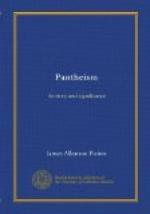[Footnote 19: “Rei alicujus singularis actu existentis.” The word “divine” does not occur in Prop. xi. Ethices II., from which I quote. But it is implied; because the mind is only a mode or modification of the infinite attribute of thought, which again expresses the eternal Substance in God. I venture a doubt whether “actually existing,” though adopted by such authorities as Sir F. Pollock gives, with any distinctness, Spinoza’s meaning. I may be wrong, but I suspect that one of the later uses of “actus,” as quoted in Ducange, affected Spinoza’s Latinity. Thus several ecclesiastical writers are quoted as using the word in the sense of office, or function. Surely this would suit Spinoza’s definition of the mind. For he treats it as a centre of phenomenal activity amidst the infinite modes of the divine attribute. Its apparent individuality is a consequence of its spontaneity as a centre of action—always understood that the spontaneity is consistent with the absolute eternal order assumed throughout the work.]
[Footnote 20: Of course the professor of optics can tell us how many vibrations in a second go to produce the particular shade of colour. But these cannot by any means be identified with conscious perception; and it is with this only that we are concerned.]
[Footnote 21: Ethices Pars II., Prop. xi. Corollarium. “Hence it follows that the human mind is part of the infinite intellect (thought) of God; and accordingly, when we say that the human mind perceives this or that, we only say that God—not in His infinity, but so far as He is expressed by the nature of the human mind, or, so far as He constitutes the essence of the human mind—has this or that idea. And when, we say that God has this or that idea, not only so far as He constitutes the nature of the human mind, but so far as He has the idea also of some other thing together with the human mind, then we say that the human mind perceives the thing in part, or inadequately.” E.G. all races have naturally supposed earthquakes and storm, battle, murder and sudden death to present ideas identical in the minds of their gods and of themselves. But Spinoza’s suggestion, as I interpret it, is that the true God has the idea of such things, not only so far as He constitutes the human mind, but as He includes the ideas of some correlated things to us inconceivable. Our idea is therefore “inadequate.”]
AFTERWORD.
[Sidenote: Spinoza’s Apparent Failure.]
[Sidenote: Power of Ecclesiasticism.]
[Sidenote: Identification of Moral Interests with Conventional Beliefs.]




